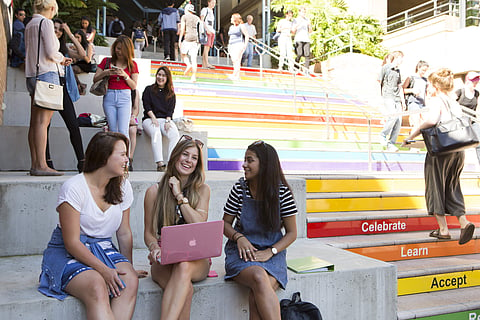

Some questions are just inevitable. To the point where you’d pinch yourself and wonder whether you’re really awake if you can make it through a spell without being accosted by them. You could have the most beautiful campuses, some of the best research facilities on the planet, labs and ergonomic spaces to kill for and a faculty line up that would read like an academic Rock n’ Roll Hall of Fame, but if you’re from an Australian University, even one of University of New South Wales’ standing, you’re still going to get asked that one staple, question by parents - ‘Is Australia safe?’
Ask Amit Dasgupta, who was India’s Consul General in Sydney when the infamous 2009 attacks happened and now serves as UNSW’s Country Director (India) and he’ll tell you that answering that question is all in a day’s work. Literally. “It’s a legitimate question that parents ask me when they meet me: ‘Is Australia safe?’. And it’s something a lot of them ask me,” he admits. It’s ironic that he gets asked this question almost ten years to the day when the first wave of attacks on Indian immigrants to Australia shocked everyone out of their ennui.
That was 2009. And those ghosts have taken a good deal of effort to exorcise, as Dasgupta tells us, “Unsavoury incidents did occur in Australia. But at the same time, the manner in which the Australian system reacted to bring about course correction was noted. There have been instances of attacks on Indian students in other countries where the system has tried to cover up. On the other hand, if you see a system trying to correct it, it impacts perception. As opposed to a system that legitimises it and says ‘Oh well, it happens to everyone’.” This is a sentiment that the Indian diaspora in Australia tends to vehemently concur with. Neville Roach, Chairman of the Advisory Board for TCS in Australia and New Zealand, a sort of patriarch of the diaspora if you will, explains it thus, “I think a lot of the safety fears are unfounded today. If you look deeper into most of the cases of Indians being attacked or even killed, you will find that in some instances, their quarrel was with other Indians.” Roach himself migrated to Australia in the mid-1960s and has seen a fair bit of the rise of the Indian diaspora.
Unlike universities in the US which have followed up attacks on Indians with increased outreach and safe practices seminars, Australian universities like UNSW have a two-pronged approach: they have a no-tolerance policy to racism and violence and a promotion of dialogue and peaceful co-existence, “We’re determined to provide a great student experience here at UNSW,” asserts Laurie Pearcey, Pro-Vice-Chancellor (International), UNSW.
For the ninth year running, the University hosted a Gandhi Jayanti memorial programme on their library lawn where a bust of the Mahatma was installed back in 2010. The bust was donated by the Indian government, by Dasgupta actually, as a sign of peace, following the unrest. “During that difficult period when there were questions about student safety, India arranged for a bust of Mahatma Gandhi to be presented to the University,” he added, “For us, this is the beginning of a two-year celebration to mark the 150th birth anniversary of Gandhi.” Which is why fear isn’t too much of a factor. Because when you get to UNSW, which is fairly representative of what a great Australian varsity is like, there’s no undercurrent of apprehension you sense among the 1,200 odd Indian students who study and research there. Just after the brightest among them are awarded tuition scholarships — very progressively named the Future of Change scholarships — some of them told us that they’ve integrated quite well, culturally and academically. “We try not to go too far out of the city or wander out at odd hours of the night but that’s pretty much the case anywhere if you want to be safe,” says Kaushik R, who’s doing a post-grad engineering degree at UNSW after graduating from a college in Pollachi, near Coimbatore.
It’s immediately evident that most of the fear stems from parents. Specifically, from their perceptions. “I remember my parents asking my uncle if Delhi was a safe place to study in when I was about to go to JNU. So fear is a legitimate concern,” says Dasgupta, adding that the perception has certainly “changed” over the years. That, coupled with uncertainty with the Trump administration’s immigration stance, the steep rise of the dollar viz the rupee and the still confounding impact of Brexit, has tipped the scales in favour of Australia. While US Homeland Security data analysed by NFAP established that 18,590 Indian students enrolled between 2016 and 2017 in the US, showing a decline of 21 per cent, Australia’s numbers have been on an upswing — registering a growth of nearly 30 per cent in 2017, over the preceding year.
Where the intake of Indian students was 350 annually as opposed to 1,300 Chinese students 3 years ago, that number now stands at over 700 Indian students being admitted to UNSW every year. And China’s enrollment is dropping. Advantage India?
UNSW will be conducting India Open days on November 20 (Chennai), November 22 (Pune) and November 23 (Mumbai). More details on eventbrite.com
